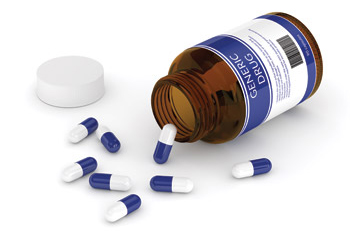Helping patients manage generic drug price increases
Generic drugs have recently become more expensive, from colchicine for gout to EpiPens for allergic reactions. Physicians are having trouble managing patients when their medicines suddenly rise in price.
Rising drug costs are old news to most U.S. clinicians, but a new wrinkle has recently arisen. Some generic drugs—once thought to be reliably affordable options—are silently transitioning back to brand-name medications, along with matching price tags.
A study published in Health Affairs last year found that the fraction of generic drugs at least doubling in price went from 1% to 4.39% between 2007 and 2013, with similar trends observed between 2011 to 2015. Of note, most of these increases involved initially low- or medium-price medications, and not usually the most widely used generics.

There used to be a simple rule of thumb that physicians would prescribe generics to help patients receive affordable care, said ACP Member Peter A. Ubel, MD, the Madge and Dennis T. McLawhorn University Professor of Business, Public Policy, and Medicine at Duke University in Durham, N.C. “That rule is no longer relevant or it doesn't apply as often as it used to,” he said. “It's just way more complicated for physicians to figure out what things are going to cost their patients, and physicians don't want to burden their patients with expensive medications if there's an affordable alternative. They just don't know what's affordable anymore.”
Toni Brayer, MD, FACP, an internal medicine physician at Sutter Health in San Francisco, explained that some generics that have been inexpensive for many years can suddenly see dramatic price increases for seemingly unknown reasons. “It affects not only the patient and the doctor in terms of compliance—making sure the patient takes the drug, making sure the patient can afford the drug, having to make changes in the drug on the formulary—but it affects the entire price of health care because hospitals are really victimized by this,” Dr. Brayer said. “They have flat pricing and when the drug cost goes up, they cannot readily adjust, and so the hospitals really get affected by rising drug prices and shortages, too.”
This issue has hit a breaking point because there is a disconnect between how doctors help their patients and patients ultimately benefiting. “Traditionally, physicians worried about their patients and latest research. Now they have to worry about price and price manipulation,” said Robin Feldman, JD, author of the book “Drugs, Money, & Secret Handshakes: The Unstoppable Growth of Prescription Drug Prices.” She noted that the situation also complicates care because patients may choose to risk rationing their medications or titrating them in other potentially dangerous ways in order to cut costs. “After all, if patients don't fill the prescription or don't take the medicine, the medicine can't help them,” she said.
What drugs are affected?
Examples of generic drugs that have recently become more expensive run the gamut from the gout treatment colchicine to nitroglycerine and the antibiotic nitrofurantoin to the much publicized EpiPen. Physicians can try to find cheaper substitutions, but options aren't always available for every condition.
According to David Reuben, MD, FACP, chief of geriatrics at the University of California, Los Angeles, David Geffen School of Medicine, the change in price for colchicine, which used to cost pennies but now is quite expensive, means that the standard management of acute gout has been systematically changed. Many physicians are now turning to alternatives such as steroids, he said.
“For something like the treatment of gout, there were alternative medications that people could be put on, but they may not work as well [or] they may not be tolerated as well … [as] the medication they had taken for a long time,” added Todd Semla, PharmD, a clinical associate professor of medicine and psychiatry and behavioral sciences at Northwestern University Feinberg School of Medicine in Chicago. “With something like an EpiPen, clearly they don't have a lot of choices. When somebody who's allergic to peanuts accidentally has ingested a peanut and they're having an anaphylactic reaction, they need to be treated right away. … There's nothing else you can really give them that's going to work the same way and work as fast.”
Drug costs can also vary by patient, region, and year. “It's this constant juggling of medications and constant explaining to patients [about] a new medicine they're going to be on,” said Dr. Brayer. “Doctors have to decide: ‘Am I going to make the switch? I've had the patient stable on a certain medicine for a long time.’”
And the related cost increases aren't all due solely to the medication itself, she noted. “If you put a patient on a new medicine, even if it's a generic equivalent, then you need to retest them to make sure it's still working. So, the effect is not just cost of the drug but cost in time to the doctor who's having to constantly make these adjustments because of cost.”
It's hard to discern the reasons behind rising generic drug costs, but Dr. Ubel said limited competition in recent years is likely the primary cause. “For any given medication, there aren't a lot of companies competing to make the generic version of that medication, so with less competition, they don't have to lower the prices as much,” he explained.
Tips and tricks
“What doctors need to do is first of all understand that they're not responsible and there's no way they can fix it, but they can make choices that will help patients,” Dr. Brayer said, stressing that this is a systemic issue. She advised several tricks for ensuring patients can afford their drugs, including always prescribing generics when possible, telling patients to shop around and use websites such as GoodRx.com, prescribing a higher dose and instructing patients to cut their pills in half, or decoupling combo pills. “Just become as informed as you can about certain drugs that you prescribe over and over,” Dr. Brayer recommended.
Dr. Reuben noted that patients sometimes can get better prices by purchasing drugs directly rather than going through their insurance, while Dr. Semla recommended that physicians caution patients to keep an accurate record of the drugs and doses they are taking. “Patients place themselves at risk for drug-drug interactions when they use multiple pharmacies if all of their medications are not in their profile being screened for drug-drug interactions,” he said.
Professor Feldman said that doctors can encourage their patients to ask about prices at the pharmacy before they buy the drugs and let their physician know if the cost is beyond their reach. “Patients may not know that other substitutes might be available. They may simply walk away from the counter,” she said. “Encourage patients to be informed consumers, encourage patients to reach back out … if the price of the medication or the price of their insurance premium strain their budgets.”
Dr. Ubel agreed. “Don't assume generic means inexpensive. Give your patients permission to get back to you if the cost is surprisingly high. Maybe find someone in your office who can talk to them and discuss alternatives,” he said. “When you have a few families of medicines that you prescribe frequently, have somebody in the office just look up what the costs are for them so you'll have a nice list in front of you displaying what is and isn't expensive.”
Physician advocacy is another potential game-changer, Dr. Ubel said. “It's great for physicians to be politically active, especially for things that affect their patients' well-being, rather than just their own financial interest as physicians,” he said. “We should be out there advocating for affordable medications. It's really complicated to know what the right policies are to keep generic medications affordable . . . but we should be demanding that our legislatures come up with potential solutions and test them.”
ACP has been advocating for two bills that aim to address the problem. The REMEDY (Reforming Evergreening and Manipulation that Extends Drug Years) Act, which has been introduced in the Senate, is intended to aid in FDA approval of more generic drug applications and improve patient access to generic medications. In addition, ACP has been involved with the CREATES (Creating the Restoring Equal Access to Equivalent Samples) Act since its inception. CREATES, which is intended to prevent egregious practices by manufacturers that keep generic drugs from coming to market, has cleared both the House Energy and Commerce and Judiciary Committees and “is ready for a House floor vote at any time,” said Jonni McCrann, ACP's Senior Manager of Legislative Affairs.
“Doctors need to be involved in this because it affects our patients and it ultimately affects everything that we do,” said Dr. Brayer. “If something is unaffordable and it's a treatment, we need to get involved and try and understand it as much as possible and try and make our voices heard in solutions.”
Those solutions, Professor Feldman noted, will ultimately require a partnership of patients, physicians, health plans, pharmaceutical companies, and elected representatives. “Everyone has a role and a responsibility to find a way out of the morass we're in right now,” she said.





